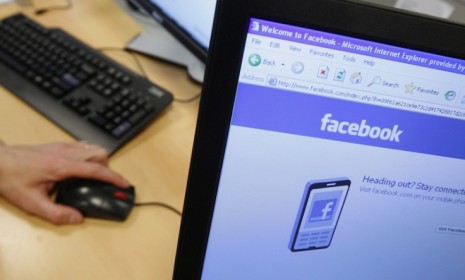A new use for Facebook: Identifying problem drinkers?
New research shows that, yes, college students who post about "getting drunk" on Facebook are more prone to alcohol abuse. Time for an intervention?

A free daily email with the biggest news stories of the day – and the best features from TheWeek.com
You are now subscribed
Your newsletter sign-up was successful
Facebook might be a great tool for college administrators and parents looking to spot potential alcohol abusers, suggests a new study published in the Archives of Pediatrics and Adolescent Medicine. College students often share their debauched adventures through social media like Facebook or Twitter — and such posts could signal to parents that it's time to "pick up the phone and have a tough conversation," says Dr. Megan Moreno, the University of Wisconsin-Madison professor who led the study. Here's what you should know:
How did researchers spot at-risk abusers?
The study looked at more than 300 college students' public Facebook profiles, placing them in three categories: Non-drinkers with no alcohol references, casual drinkers, and those who referenced "getting drunk" or "being wasted" in their status updates or pictures. Students were then tested in a clinic to assess problematic drinking. Perhaps unsurprisingly, nearly 60 percent of the students who had explicit references to being drunk were at high risk for alcohol dependence and abuse — compared to just 23 percent in the group that didn't post about boozing.
The Week
Escape your echo chamber. Get the facts behind the news, plus analysis from multiple perspectives.

Sign up for The Week's Free Newsletters
From our morning news briefing to a weekly Good News Newsletter, get the best of The Week delivered directly to your inbox.
From our morning news briefing to a weekly Good News Newsletter, get the best of The Week delivered directly to your inbox.
This all seems painfully obvious, doesn't it?
Perhaps. But because many college students don't go to the doctor regularly for check-ups, there is little clinical data available for alcohol-related problems, says Bonnie Rochman at TIME. About 1,7000 college students die every year from alcohol-related incidents, and researchers believe that Facebook could provide clues that identify at-risk students in advance, potentially helping to prevent dangerous behavior.
What should parents and educators do now?
Universities could use Facebook's targeted keyword advertising for terms like "drunk" or "blacked out," and display links to health centers and other campus resources students may not be aware of, says Prescott Carlson at Imperfect Parent. And in individual cases, alcohol-soaked social media posts might signal to parents and friends that it's time for an intervention. "Our hope from this study," Dr. Moreno says, "is that we will be able to empower someone to approach a student and say, Are you doing okay?"
A free daily email with the biggest news stories of the day – and the best features from TheWeek.com
Sources: TIME, Imperfect Parent, ZDNET
-
 ‘Restaurateurs have become millionaires’
‘Restaurateurs have become millionaires’Instant Opinion Opinion, comment and editorials of the day
-
 Earth is rapidly approaching a ‘hothouse’ trajectory of warming
Earth is rapidly approaching a ‘hothouse’ trajectory of warmingThe explainer It may become impossible to fix
-
 Health insurance: Premiums soar as ACA subsidies end
Health insurance: Premiums soar as ACA subsidies endFeature 1.4 million people have dropped coverage